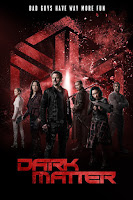Ship Breaker by Paolo Bacigalupi
Published: Little, Brown & Company, 2010
Series: Book 1 of the Ship Breaker Trilogy
Awards Won: Locus YA Award
Awards Nominated: Andre Norton Award
The Book:
“In America's Gulf Coast region, where grounded oil tankers are being broken down for parts, Nailer, a teenage boy, works the light crew, scavenging for copper wiring just to make quota--and hopefully live to see another day. But when, by luck or chance, he discovers an exquisite clipper ship beached during a recent hurricane, Nailer faces the most important decision of his life: Strip the ship for all it's worth or rescue its lone survivor, a beautiful and wealthy girl who could lead him to a better life. . . .” ~WWend
This is the second book I’ve read by Bacigalupi, the first being The Wind-Up Girl (before I started this blog). This is his foray into young adult fiction, and I read it while on vacation in Scotland.
My Review: 4/5
Having read one of Bacigalupi’s adult novels, I feel like he adapted his style well for a slightly younger audience. The bleak future world of environmental collapse seems to be carefully crafted, but the world-building information is backgrounded in favor of the immediacy of Nailer’s life. Nailer has plenty of obstacles holding him back, including an abusive father and a society that seems designed to ensure his life will be short and brutal. His tenacity in the search for a better life is easy to understand and sympathize with, and the extreme cruelty of his life situation makes it easier to forgive him any missteps. Nailer is also not a lone hero. His relationships with others on the ship-breaking beach are important, and the girl he rescues from a crashed ship (Nita) plays a much larger role in his life than a simple “rescued maiden”.
I appreciated that the book is not afraid to fully consider difficult ideas. It is frank about the calculations desperate people may need to make for their survival, and how easy it is for the privileged to choose not to notice systematic exploitation. There’s also considerable friction between Nita and the working class people (like Nailer) who she relies on for help, despite that she is a capable person and doesn’t intend to treat anyone poorly. The story is intense, with lots of action and conflict, and I was always eager to see what would happen next. I also found it a little stressful, simply because I liked Nailer and wanted him to succeed against all the odds stacked against him. Though it is targeting a YA demographic, I think many other adults would also enjoy it as much as I did.











